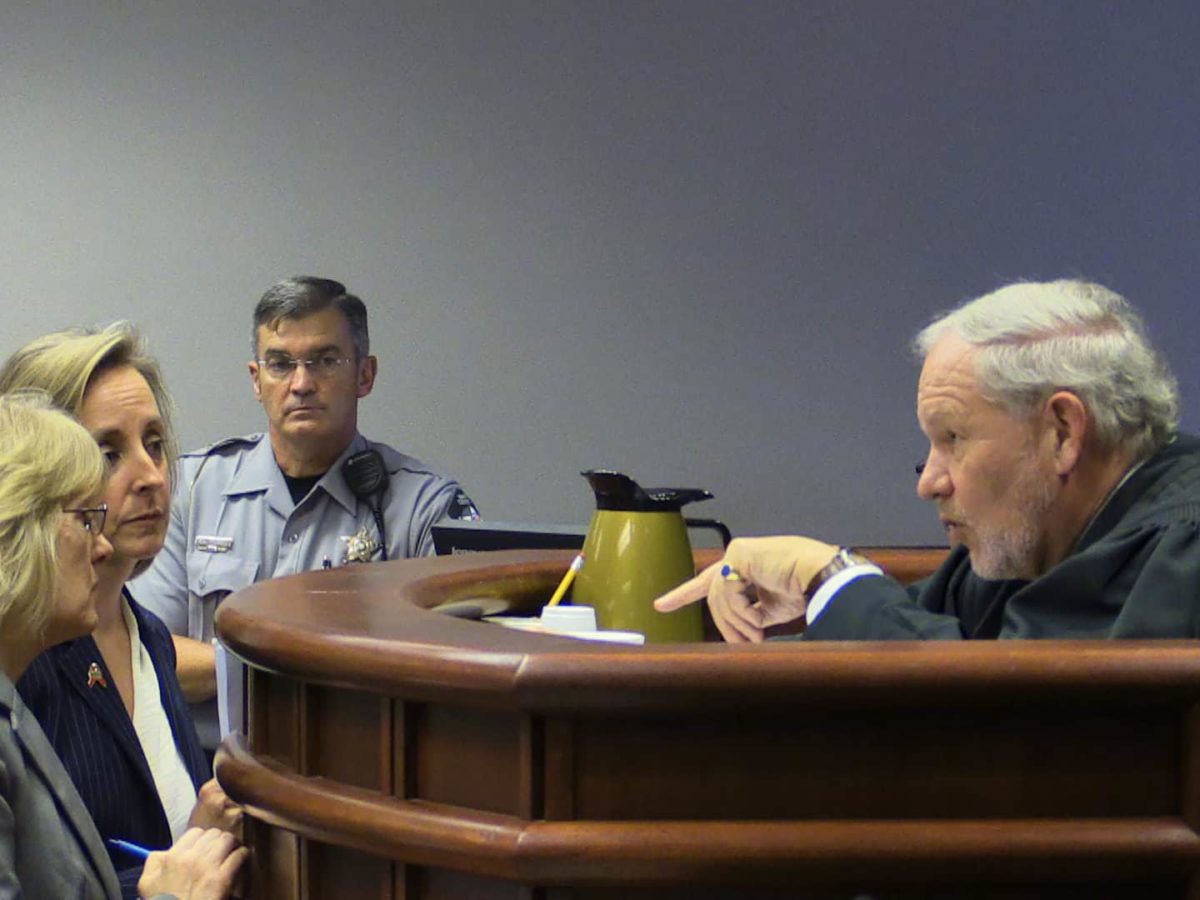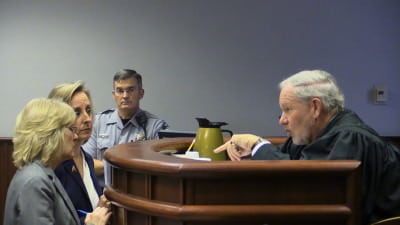

On Tuesday — the first day of a three-day hearing on the State plan to address constitutional deficiencies in providing a sound basic education — Judge Manning said:
I would like to remove a whole bunch of school boards — but I can’t do it — because they don’t do anything but worry about the employment opportunities for friends and not what’s happening in the classroom. Let’s get it out in the open. We know exactly who they are and where they are and they continue to exist and they don’t need to be between the teachers and the superintendent and threaten the superintendent. They don’t need to be there. They need to be gone. Hopefully the legislature will give the State Board of Education the tools to get rid of those obstreperous people and then let the superintendent worry about students, rather than his or her job or who gets the Drivers’ Ed job in x county.
This occurred in a case that has focused on the need for a quality teacher in every classroom, a quality principal in every school, and adequate instructional resources to serve every child. So it is worth asking the question —
If what happens in the classroom is so important, can local boards really affect student achievement?
The answer is yes. School boards can and do improve student achievement. School boards also can and do depress student achievement. Tom Alsbury, an internationally recognized scholar on school board governance, has studied this issue for years, including in North Carolina. In the introduction to his new book1 he notes:
Current research makes it clear that school boards do indeed make a difference in student achievement. Undeniably, increases and declines in student performance link to board member values and beliefs,2 actions,3 teamwork,4 and political conflict and turnover.5
When a local board causes a decline in student performance, it raises constitutional issues. Earlier in this Leandro litigation, the State claimed that it was not responsible for failings of a local board. The North Carolina Supreme Court disagreed. In its 2004 opinion, it stated:
In the State’s view, any holding that renders the State, and by the State we mean the legislative and executive branches which are constitutionally responsible for public education, accountable for local school board decisions somehow serves to undermine the authority of such school boards. This Court, however, fails to see any such cause and effect. By holding the State accountable for the failings of local school boards, the trial court did not limit either: (1) the State’s authority to create and empower local school boards through legislative or administrative enactments, or (2) the extent of any powers granted to such local school boards by the State. Thus, the power of the State to create local agencies to administer educational functions is unaffected by the trial court’s ruling, and any powers bestowed on such agencies are similarly unaffected. In short, the trial court’s ruling simply placed responsibility for the school board’s actions on the entity — the State — that created the school board and that authorized the school board to act on the State’s behalf.
This means that the State has a responsibility to – as Judge Manning put it – “get rid of obstreperous people” on local boards and take whatever other action is necessary if a local board is the impediment to student success. It also means that the State has an obligation to provide local boards with the tools they need in order for their school districts to have the teachers, principals, and resources that are constitutionally required.
So how does the State do this?
The ability of the State Board to get “rid of obstreperous people” was actually taken away by the General Assembly in 2007.6 Before this repeal, the State Board had the authority to investigate charges that a member of a local board was not discharging his duties or was guilty of immoral or disreputable conduct and, if the charges were found to be true, to vacate the office. The only provision remaining is that the State Board has the authority to suspend the duties of a local board if it fails to cooperate with an interim superintendent appointed by the State Board in a low-performing school district.
The State Board addresses the issue in the State plan it submitted to Judge Manning. The plan states:
“Over the course of those years [of intervening in low-performing schools], the Board has determined that student achievement and school success are often impacted by ineffective superintendents and local boards of education. The Board believes effective models for intervention and/or takeover may exist and recommends a study of models in other states in order to develop a workable model here. Such models could include methods to intervene in local governance, a method for fully taking over the function of the local board, and a procedure for merging or consolidating local school systems.”7
The Senate version of the State budget, House Bill 97, also looks at the issue. While claiming that the State has met its obligation for funding, it asserts that some local boards have failed. Part of the means for correcting the deficiencies identified in the budget bill is to give the State Board the authority to consolidate local school administrative units in contiguous counties and more detailed requirements for plans for improving low-performing school districts.8
This section of the budget does not address the capacity of local boards or local board members. And, in fact, in the section preceding this, the Senate version of the budget eliminates mandatory annual training for local board of education. 9 It is hard to see how this helps build the capacity of local boards to address student success.
While it has not been presented to a committee yet, another approach that is apparently being contemplated in drafted legislation is to remove the five lowest-performing schools in the state from the control of the local boards and place them in a state Achievement School District that is under the State Board and managed by contract by an operator with charter-like authority and flexibility. This is a model based on achievement districts in other states that has been controversial.
If we are to look out of state, there are other approaches. In the court hearing on Tuesday, Pat Ashley, former director of the school transformation with the Department of Public Instruction, brought to the court’s attention that in Kentucky, the superintendent has the authority to hire and fire personnel. This is spelled out in state statute: “He shall be responsible for the hiring and dismissal of all personnel in the district.”10
Tom Alsbury has worked with hundreds of local boards and has worked with states to find models that improve student achievement by creating more effective boards. Using what he calls a “balanced governance model,” research demonstrates improvements with boards that have led to improvements in student achievement.11 He also has worked at the state-level in West Virginia and Kentucky to craft state-level approaches. It is important to know that there are state-level options to these difficult issues.
While we sift through these options, there is one court opinion issued on Tuesday – not in Judge Manning’s courtroom but down the street in the North Carolina Court of Appeals – that will affect the transparency of board decisions on personnel matters. Local boards go into closed session to discuss personnel matters and have maintained that the minutes of those closed meetings are not subject to disclosure under public records. The Court of Appeals rejected this categorical exclusion. Instead, the Court of Appeals distinguished between “core personnel information,” such as work performance and reasons for an employee’s departure, and a board’s “political and policy considerations.” Core personnel information is not subject to disclosure, but the board’s political and policy considerations are. It further held that it is up to the trial court — not the board of education — to decide what is subject to disclosure under this test. While teasing out political and policy considerations from core personnel issues is going to be challenging, it will be interesting to see if this results in any changes in board behavior.
And a caveat as we consider how to address obstreperous people on boards: we need to make sure that we do not limit the ability of well functioning boards to support public education. The Senate took a step towards this on Wednesday when it passed an amendment to a bill to place a five-year moratorium on local boards to dispute their local budgets. Well functioning boards take seriously their commitment to seek the funding they need to meet the constitutional obligations to provide each child with a sound basic education. Unless and until the State takes on the full cost of this, it should not hinder the ability of a local board to seek the funding it needs from the county commissioners. This is a part of the two-fold responsibility of the State to both address failing boards and provide the necessary tools to well functioning boards.
It is clear that we do not have a complete plan in this State for doing this. The court, the State Board, and the General Assembly are all considering it. What would you add to the discussion on this?


